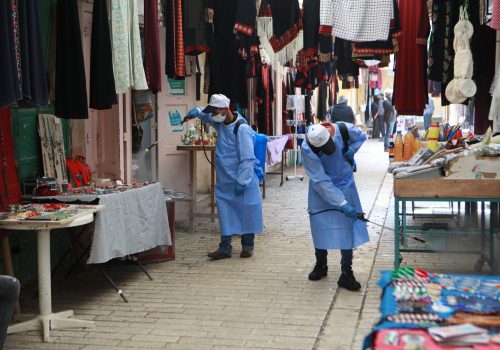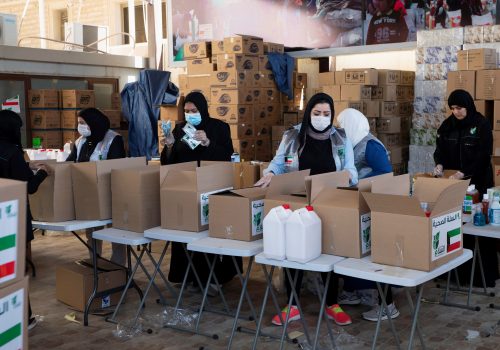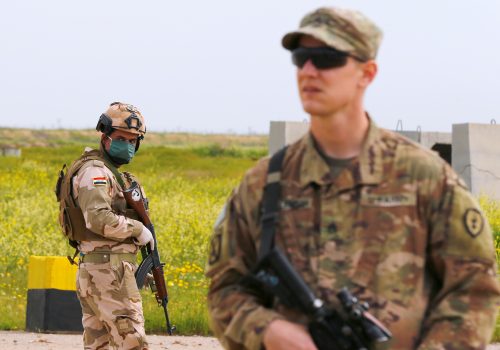Amid the coronavirus, where are US-Gulf counterterrorism efforts headed?
As governments of the Gulf Arab states seek to meet the extraordinary challenges posed by COVID-19, extremists have hastened to find ways to exploit the crisis. Whether it be through a mix of increased online propaganda or the use of uncertainty—such as the rapidly changing data about the pandemic and the reshaping of life as we know it—to further their ends, extremists have identified a window of opportunity to exploit the fears prompted by severe health and economic distress.
The coronavirus, coupled with the collapse in oil prices—that has been fueled by the Saudi-Russian oil price war—and the pandemic-driven contraction of the global economy, threatens to weaken existing social contracts and exacerbate the drivers of radicalization, such as fear and uncertainty caused by imminent death or loss of family members, among other things. Diversifying hybrid threats to the United States and the Gulf—an increase in the use of drones, social media disinformation campaigns, and greater vulnerability to cyber-attacks—are now aided by pandemic distress and distraction. With no end in sight for the virus, it is time to start planning for a much different future.
According to Andrew Silke, professor of Terrorism, Risk, and Resilience at Cranfield University, the “ability of government, intelligence and law enforcement agencies that focus on traditional priorities such as counterterrorism has been undermined.” Most state apparatuses in the Gulf are seeing themselves be completely absorbed by the health emergency, with security forces and resources stretched and a “dual-shock” from a severe downturn in economic activity and corresponding low oil prices. The social, health, and the economic commotion brought by the pandemic create the catalyzing opportunities that extremist groups and non-state actors seek to exploit to further the erosion of security and stability and wreak havoc among the social capital of the Gulf Arab states.
ISIS
UN Secretary-General António Guterres has warned that extremist groups are taking advantage of COVID-19 to intensify their efforts to recruit young people who are spending more time online, while he called for a “global ceasefire.” However, the Islamic State of Iraq and al-Sham (ISIS) has increased its attacks against Iraq’s security forces in recent weeks. And, although not unusual for their attacks to escalate amid the holy month of Ramadan that ended in May, the group has and will probably continue to capitalize on the uncertainty brought by the pandemic, especially given the security vacuum left by the virus, such as the expedited scale back of US forces in Iraq.
In the March edition of Al-Naba, the weekly newsletter of ISIS, the group urged its followers to “step up their attacks on crusader nations.” The group mentioned that, while “crusader nations”—referring to the West, specifically the US and Europe—remain distracted with the pandemic, international and regional security norms that keep them in check can no longer cope. Therefore, they urged their followers to take advantage of the situation. ISIS also threatened to “escalate their military operations against [the West’s] apostate helpers in Muslim countries.”
Although with different goals and targets, al-Qaeda made sure to follow suit.
al-Qaeda
In the latest issue of its magazine Inspire, al-Qaeda capitalized on the Pensacola attacks’ May 2020 press release by the FBI and their links to the plot, which took place in December 2019 at the Naval Air Station in Pensacola, Florida. According to Abdullah Khaled, an associate fellow at the International Centre for the Study of Radicalization (ICSR), the latest issue of the magazine claims that the Arabian Peninsula remains the center of support and strategic depth to liberate the two Holy mosques in Saudi Arabia—the Al-Haram Mosque in Mecca and the Prophet’s Mosque in Medina. According to Abdullah, the propaganda article stresses the fact that “Saudi [Arabia] has always been and remains a major target of the group and its biggest prize” and “that one of the biggest benefits of the Pensacola attack is the cracks it caused in the relationship between the US and Saudi Arabia.”
IRGC-backed militias
Kataib Hezbollah and Nujaba, both Iran-backed Shia militias in Iraq, recently released a statement vowing to take revenge against “four thousand Saudi terrorists that entered Iraq within a year” and calling for attacks against Saudi Arabia. According to Dr. Abdel-Azis Aluwaisheg, the Assistant Secretary-General for Political & Negotiation Affairs of the Gulf Cooperation Council (GCC), this could be an attempt by Iran’s Islamic Revolutionary Guard Corps (IRGC) to “derail Saudi-Iraqi rapprochement.” The call came after Iraq sought debt relief from its neighbor Kuwait, while also seeking to bolster economic cooperation with Riyadh and issuing directives for the return of its ambassador to Baghdad.
The explicit calls for violent attacks come as the pro-IRGC camp seeks to disrupt any sign of closer ties between Saudi Arabia and Iraq amid severe economic strains, such as a decrease in revenues from low oil prices.
Additionally, a recent and major money-laundering effort, which was made on Iran’s behalf through the Gulf Arab states, further illustrates how state-sponsored terrorism and semi-legitimate players—such as state-allied actors like the Lebanese militant group Hezbollah—will continue to seek the maintenance of corridors for sanctions-immune facilitators, who are often subsumed into criminal networks. Illicit schemes facilitators, such as Iran and Hezbollah’s, who are intensifying cooperation with states in the western hemisphere, are also likely to continue their use of legitimate entities in the Gulf and the US for illicit financing. Amid pressing priorities, one recommendation to consider is a counterstrategy that intensifies collaborative disruptions with the Gulf states on terror financing, with enhanced information-sharing regarding terrorist data, transactions, and activities.
A turning point for counterterrorism efforts
As the pandemic causes people to use new methods of communication and easy financial transactions, isolating extremist groups from abusing legitimate ways of communication and the financial system could serve to safeguard these much-needed resources for legitimate use. Additionally, counterterrorism efforts in states’ strategic messaging could be better served by conducting enterprise assessments to determine whether these are reaching the audiences that matter and if they are having an impact.
The ever-changing security implications of the virus and the oil price collapse have also created conditions, challenges, and opportunities for the Gulf Arab states to reassess their role in international and regional security cooperation. The recent statements by the Shia militias in Iraq could be “a more ominous sign of a planned escalation in the Gulf; trying to take advantage of the global preoccupation with COVID-19 and the talk about shifting US security priorities,” added Dr. Aluwaisheg.
With extremists thriving in chaos, the extraordinary challenges posed to counterterrorism cooperation as the security landscape adjusts to the pandemic are real. The US will have an opportunity beyond 2020 to build on its historical alliance with the Gulf and focus on its latest National Strategy of Counterterrorism, which encourages capacity building among its partners.
Without a foreseeable end to the shocks of coronavirus, counterterrorism strategic cooperation with the Gulf presents a worthwhile opportunity of revitalized enthusiasm to further integrate sustainable measures under the on-going Middle East Strategic Alliance (MESA) discussions. Economic goals, pandemic responses, and security strategies can be harmonized to ensure increased resilience to future terrorist attacks. MESA, often referred as the Arab NATO, intends to become a major alliance that advances regional security, prosperity, and stability between Gulf Cooperation Council (GCC) countries (as well as Jordan and Egypt) and the US.
The MESA collective provides the suitable framework for US interests to be well-served by an increased focus on US-Gulf training and capacity-building partnerships. These would contribute to interoperability and the empowering of local capabilities of safety, security, and justice to maintain stability, the rule of law, and prevent the spread of extremist ideologies.
Joze Pelayo is a program assistant at the Scowcroft Middle East Security Initiative/Middle East Programs. Follow him on Twitter: @jozemrpelayo.
Image: Saudi Arabia Defense Attache Major General Fawaz Al Fawaz and his Embassy staff and other officials arrive to meet with the Saudi students who remain restricted to the Naval Air Station (NAS) Pensacola base by their Saudi commanding officer, in Pensacola, Florida, U.S. December 9, 2019. FBI Jacksonville/Handout via REUTERS


